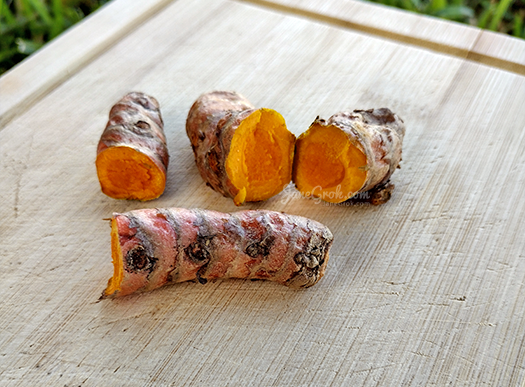
Turmeric is a plant relative to the ginger family. The most notable part of the turmeric plant is it’s rhizome, a root-like stem. This rhizome is harvested, cleaned, and then processed to produce the vibrant yellow-orange spice that is commonly used in cooking and as a natural remedy. The active compound responsible for many of its health benefits is called “curcumin.”
It is renowned for its anti-inflammatory, antioxidant, antimicrobial properties, and it has been studied for its potential in addressing a range of health conditions.
Benefits of Turmeric
- Digestive Aid: Turmeric can promote healthy digestion and alleviate symptoms of indigestion and bloating.
- pH Chemical Analysis: Turmeric can be used as a natural pH indicator, but it may not be as precise or reliable as synthetic pH indicators or pH meters. In acidic solutions, it appears yellow, while in alkaline (basic) solutions, it turns red.
- Immune System Support: Turmeric can help bolster the immune system, aiding the body’s ability to defend against illnesses and infections.
- Skin Benefits: Turmeric’s anti-inflammatory and antioxidant properties can promote healthy skin. It is used in skincare products to address various skin issues.
- Anti-inflammatory: Curcumin is a potent natural anti-inflammatory compound. It can help reduce inflammation in the body, which may be beneficial for individuals with chronic inflammatory conditions and pain.
- Kidney management: Curcumin’s ability to inhibit crystal growth in the kidneys could be beneficial in reducing the risk of kidney stone formation. It has also been investigated for its potential to improve kidney function in individuals with diabetic nephropathy, a complication of diabetes affecting the kidneys. These are 10 Foods That are Great for Your Kidneys.
- Black pepper also known as piperine, when paired with turmeric, increases better absorption of curcumin. The extract of piperine which is known as BioPerine, is an ingredient that is commonly included in many supplements and spices.
- Antioxidant Power: Turmeric is rich in antioxidants, which help protect the body’s cells from damage caused by free radicals. This may contribute to overall health and may even play a role in cancer prevention.
- Brain Health: Curcumin has shown potential in supporting brain function and reducing the risk of neurodegenerative diseases like Alzheimer’s. It may also help enhance memory and cognitive function.
- Heart Health: Turmeric is associated with a reduced risk of heart disease. It can improve the function of the endothelium, the lining of blood vessels, which is important for cardiovascular health. Talk to your doctor before you start using turmeric supplements.
In moderation, turmeric can make a great addition to meals, drinks, and juice cleanses. This is one drink recipe that includes black pepper to enhance the effects of curcumin.
Possible Side Effects
Turmeric is generally considered safe when consumed in moderate amounts as a spice in food. However, when taken in larger quantities or as a supplement, it can potentially cause side effects in some individuals. It’s important to be aware of the potential side effects.
- Gastrointestinal Issues: Turmeric may cause gastrointestinal problems such as nausea, diarrhea, and upset stomach, especially when taken in high doses.
- Increased Risk of Kidney Stones: Turmeric contains oxalates, which can contribute to the formation of kidney stones in individuals who are prone to this condition. If you have a history of kidney stones, you should be cautious with turmeric intake.
- Blood Thinning: Curcumin, the active compound in turmeric, can have mild blood-thinning effects. While this can be beneficial for some people, it can increase the risk of bleeding in others, particularly if they are already taking blood-thinning medications like warfarin.
- Gallbladder Issues: Turmeric may cause contractions of the gallbladder, which could be problematic for people with gallbladder issues or those who have recently had their gallbladder removed.
- Allergic Reactions: Some individuals may be allergic to turmeric, leading to skin rashes, itching, or other allergic symptoms.
- Interactions with Medications: Turmeric supplements may interact with certain medications, such as anticoagulants, antiplatelet drugs, and drugs that reduce stomach acid. It’s essential to consult with a healthcare professional if you are taking any medications.
- Iron Absorption: Curcumin can inhibit the absorption of non-heme iron (the type of iron found in plant-based foods) in the body. This could potentially be an issue for individuals with iron-deficiency anemia.
- Stomach Ulcers: Turmeric may stimulate stomach acid production, which could exacerbate symptoms in individuals with stomach ulcers or acid reflux.
- Dizziness and Diarrhea: Very high doses of turmeric or curcumin may lead to dizziness, headaches, and excessive diarrhea.
It’s important to remember that individual responses to turmeric can vary. If you are considering taking turmeric supplements for therapeutic purposes, consult with a healthcare professional.

